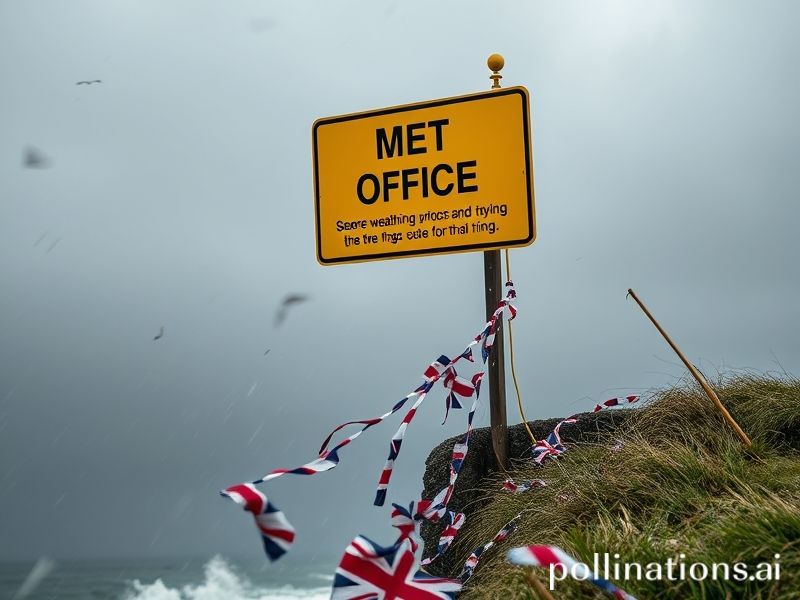UK Braces for ‘Bins Aloft’ Weather Event While the Rest of Earth Checks Real Catastrophes
Met Office Issues Strong-Winds Warning; Rest of Planet Politely Stifles a Yawn
By Our Man in the Jet Stream
LONDON—On Tuesday the United Kingdom’s Meteorological Office, the granddaddy of national weather services and still clinging to imperial measurements like a pensioner clutching a ration book, hoisted its yellow “be aware” flag for gusts that may—brace yourselves—topple wheelie bins. From Land’s End to the Firth of Forth, the civil populace was urged to secure garden gnomes and postpone non-essential hanging of laundry. The alert is expected to run for approximately 36 hours, or roughly the time it takes a French rail strike to agree on a coffee break.
An island adrift in its own micro-drama is nothing new, of course. Yet the ripple effects of a stiff British breeze travel farther than one might think. Cargo insurers from Rotterdam to Singapore immediately recalibrate their risk algorithms: every extra knot over the Dogger Bank pushes a container ship’s arrival in Shanghai back by three hours, giving commodity traders in Chicago an unexpected window to short the global oat futures market. Meanwhile, the North Sea wind farms—those majestic pinwheels of green salvation—will spin so furiously that Denmark briefly contemplates exporting surplus electrons to Poland at negative prices, a financial phenomenon economists describe as “paying someone to eat your leftovers.”
Across the Atlantic, the National Weather Service offers a diplomatic golf clap. Americans, busy measuring things in freedoms per square eagle, note that a Category-1 hurricane would file the UK warning under “quaint.” Still, they remember 1987, when a Channel storm without a proper visa flattened 15 million trees and Michael Fish became the only meteorologist in history whose name doubles as a punchline. In the Caribbean, hurricane veterans glance at the Met Office tweet and return to nailing plywood over windows that have met actual Category-5 tantrums. Perspective, like rum, is best served neat.
Further south, Australian insurers watch the barometer with the detached interest of a crocodile eyeing a drifting thong. Bushfire season is ramping up, and a European zephyr barely registers next to their brand of 120 km/h furnace winds that can melt traffic lights. Still, reinsurance contracts are globalized now: every airborne patio umbrella in Sussex nudges premiums upward in Perth. The invisible hand of the market is wearing a very windy glove.
Back in Europe, German rail operator Deutsche Bahn preemptively cancels four ICE services “just in case,” a level of operational pessimism that would make a Berlin waiter blush. In Switzerland, the Gotthard tunnel schedules extra ventilation in case the Alpine Föhn decides to gate-crash the party. And in Brussels, the European Commission’s emergency-response unit convenes an ad-hoc committee to draft harmonized wind-noise decibel limits, a document destined to be 400 pages long and completely unread.
Human nature, ever the reliable punchline, responds predictably. Twitter morphs into amateur cinematography: grainy clips of airborne trampolines performing graceful arcs over semi-detached houses. TikTok influencers chase garbage down high streets like bargain-bin storm chasers. Within minutes, a GoFundMe appears for a decapitated garden flamingo; it raises £12,000 because the internet is nothing if not sentimental about lawn ornaments.
Yet beneath the slapstick lies a sobering trend. Extreme-weather bulletins, once the preserve of monsoon countries and tornado alleys, now sprout weekly across temperate latitudes. Climate change has turned meteorology into a global gallows humor routine where every punchline ends with “…and wait until tomorrow.” The Met Office’s mild advisory is thus a postcard from the future: Dear World, brace for routine turbulence.
Conclusion: when the UK warns of a blustery spell, the planet does not shudder—but it does adjust. Supply chains twitch, spreadsheets recalculate, reinsurers sigh, and somewhere a Norwegian ferry captain re-ties a knot. All for winds that wouldn’t ruffle a toupee in Patagonia. Still, if you happen to be strolling along Brighton pier with a latte and a sense of immortality, consider the yellow flag a gentle reminder: nature has a sense of irony, and it’s picking up speed.







